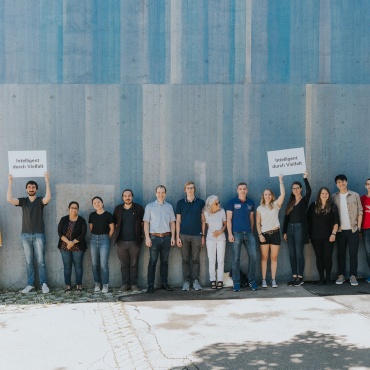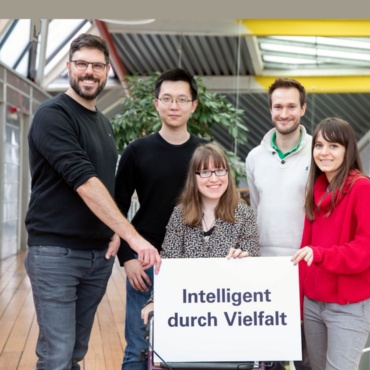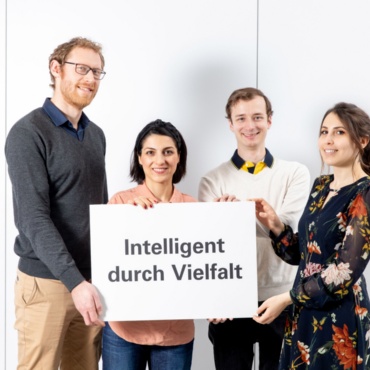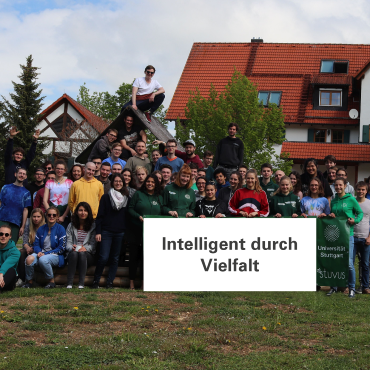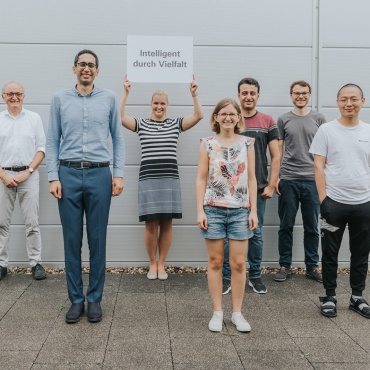
A place where everyone feels comfortable
The organizational culture at the University of Stuttgart is defined by openness, respect, fairness, and appreciative collaboration define. Each of the 27,000 individuals at our university should feel recognized and taken seriously and actively participate in shaping an inclusive university culture. University members from administration, research, and teaching are actively advocating for this.
By keeping pace with social developments, employees, researchers, and students develop strategies and guidelines foster an open-minded and equitable research, studying and working environment.
Building an inclusive university culture is a core mission at the University of Stuttgart, one that we can only achieve together. The communities we create along the way define our university and pave the way to our shared success.
Prof. Judith Tonhauser, Vice Rector for Early Career Researchers and Diversity and Dr. Grazia Lamanna, Gender Equality Officer
Shaping diversity and gender equality together
The uniqUS unit is actively involved in developing and implementing strategic concepts to shape an inclusive university culture, supporting and advising the university management. In particular, this unit supports the Vice Rector for Early Career Researchers and Diversity and the Gender Equality Officer. The promotion of diversity and gender equality is seen as a joint effort across the board, in which numerous other stakeholders are involved.
The fundamentals of our work
The University of Stuttgart is committed to a proactive and forward-thinking approach to diversity. The university regards the achievement of equal opportunities and inclusion, in the broader sense, as a social mission that must be fulfilled for the benefit of all. Legal requirements form a solid base for this work. Furthermore, the University of Stuttgart has made further (voluntary) commitments in order to fulfill these requirements.
Projects, activities, and measures
Here, you will find an overview of the offers and activities at the University of Stuttgart related to diversity, equality, and inclusion, or you can search by keywords.
- Accessibility and participation
- The University of Stuttgart is committed to removing any existing barriers for its students, employees, and guests with disabilities.
- Advice, support and information
- The University of Stuttgart offers numerous counseling and support options for students and employees in the areas of equal opportunities, diversity, anti-discrimination and life crises.
- Appointment committees and appointment procedures
- Active support and advice for appointment committees, along with the expansion of gender-sensitive and diversity-oriented appointment management.
- Diversity and gender competencies
- The University of Stuttgart offers its members various formats for professional development and training as well as certificates.
- Diversity fund
- The establishment of a diversity fund aims to support existing, planned, and new activities within the faculties and to evaluate their success in the future. Applications are submitted to the Vice Rectorate for Diversity and are approved by the Rectorate.
- Family-friendly university
- The University of Stuttgart has already received several awards for being family-friendly. It dedicated to the continued development of the support programs it currently provides for employees and students by way of family-friendly work and study environments.
- Gender and diversity in research
- The guiding principle of networked disciplines, this characterizes the University of Stuttgart's extraordinary research profile and has become one of its defining features. Cultural diversity and the consistent collaboration between complementary disciplines fosters more differentiated thinking.
- The University of Stuttgart's research profile
- Application advice for gender and diversity aspects
- Institute for Diversity Studies in Engineering (IDS)
- Research project "LSBTTIQ in Baden und Württemberg. Living environments, repression and persecution during the National Socialism era and in the Federal Republic of Germany”
- Gender and diversity in teaching
- The University of Stuttgart sees great potential in the heterogeneity of its students, the development of which is a top priority. Courses that are designed with diversity in mind offers those participating the chance to give one hundred percent, to advance research topics to the best of their ability, and to enjoy learning and teaching in a productive environment.
- Gender monitoring
- The continuous monitoring and assessment of the university's progress toward its equality goals are primarily conducted through the gender equality plan, which is an integral part of the University of Stuttgart's structure and development plan, as well as through other strategic documents.
- Handling cases of discrimination, sexism, and sexual violence
- Central contacts provide advice and support to those affected by or involved in cases of discrimination or sexual violence. What constitutes discrimination and the processes defined for addressing it at the University of Stuttgart are outlined in a separate guideline.
- Initiatives for refugees
- The "Begegnungsraum" for refugees and Stuttgart citizens serves as a meeting place for all residents of Stuttgart, encompassing diverse ethnic, cultural, linguistic, and ideological backgrounds. The student initiative Freundeskreis Flüchtlinge (Circle of Friends for Refugees) offers support for integrating into university life and organizes various engaging activities.
- Promoting equal opportunities for girls and women
- The University of Stuttgart targets women and girls of various ages with the aim of advancing equal opportunities and gender equality, not only at our university but also in a wider social context.
- Strengthening gender diversity
- Since April 2022, it is now straightforward to change your name at the University of Stuttgart, even if the official process of changing your name and civil status has not yet been completed.
- Studium Generale and guest auditor study programs
- Academic education for everyone is the motto of the Studium Generale (extracurricular studies) department. Whether you are a student looking for additional courses, a high school graduate who would like to learn more about the study programs available, or a professional in search of continuing education courses, or you are a senior citizen with an interest in certain fields: the General Studies department is the right place for you!
Actively involved in networks
The University of Stuttgart provides information and actively participates in numerous networks within and outside the university, both regionally and nationally. As a member, it actively shapes gender policy strategies within the university landscape, shares ideas, and draws inspiration for fostering university culture.
- Working groups (AK) at the University of Stuttgart
- Antidiscrimination working group
- Accessible Campus working group
- Education and Social Inequality working group
- Faculty diversity commissions
- Diversity commissions in the faculties help to identify diversity issues and address them with appropriate measures. In addition to the Faculty Gender Equality Officers, faculties may optionally elect Diversity Officers, who also become members of the Diversity Commission of their respective faculty. These decentralized structures make it possible to include all perspectives in diversity management at the University of Stuttgart and to ensure communication between the central structures and the faculties.
- Diversity round table
- The Diversity Round Table serves as a discussion forum for people involved in diversity issues at the University of Stuttgart and other interested parties. This promotes exchange between the institutions, the faculties, and the Rectorate. This networking enables the flow of information, the bundling of existing measures and the development of new actions. Dynamic and flexible working groups can be formed from the Diversity Round Table to look at specific diversity issues from different perspectives. The Vice Rector for Early Career Researchers and Diversity and the Gender Equality Officer invite all individuals involved in diversity initiatives to participate.
- External networks
- State Initiative for Women in STEM Professions
- Forum for Equal Opportunities in Working Life
- Work-Life Balance Network for the Region Stuttgart
- TU9 Gender equality expert panel
- Diversity network at universities
- Federal Conference of Gender Equality Officers at Universities (bukof)
- State Conference of Gender Equality Officers (LaKoG)
- ArbeiterKind.de
- First-generation students
How teams at the University of Stuttgart benefit from diversity
[Photos: o.A., GTUS-Max Partenfelder, o.A., o.A., o.A., o.A., o.A.]
An inclusive place to work and study
Contact

Judith Tonhauser
Prof. Dr.Vice Rector for Early Career Researchers and Diversity

Grazia Lamanna
Dr.Gender Equality Officer

Beate Langer
Head of uniqUS











